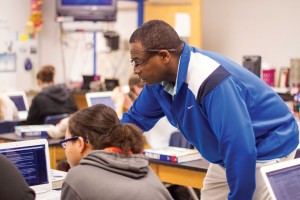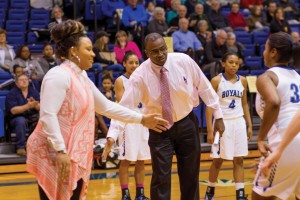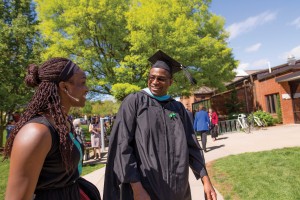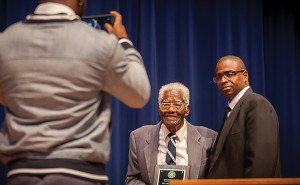
Eric Payne MA ’16 (education) helps a student with a webquest project in a Fort Defiance High School biology class. (Photos by Jon Styer)
… our present sufferings are not worth comparing with the glory that will be revealed in us.
~ Romans 8:18
Eric Payne never set out to earn a master’s degree in education, which he received in May 2016 at Eastern Mennonite University. Among the many ways he identifies himself – father, husband, special education teacher, basketball coach – Eric Payne, holder of a graduate degree, hasn’t quite sunk in yet.
His mother, Rosetta Harris Payne, would have been proud, Payne says. When he was born in May 1963, just three months before Martin Luther King, Jr.’s “I Have A Dream” speech, she was a senior at the segregated Central Augusta High School in Augusta County Virginia. Payne still has her notebook from English class.
“I read what she’s written and she was clearly, clearly so very smart,” he said. “I’ve always compared myself to her. I’ve always struggled and I’ve never been an A student.”
His great-grandmother Mamie Jones Rhodes, too, would have been just as proud. She raised little Eric until she passed away before the start of his eighth-grade year.
As easy as studies came to his mother, it’s been a long, hard road for her son. Any graduate student who takes classes one at a time, who balances family and work responsibilities, will say the journey to graduation is grueling. But for Payne, the obstacles in this years-long process are of Job-like proportion; his story reflects as much on his own character as it does on the institution of EMU, what it currently is and what it strives to become.
Turned Away
Payne, a native of Waynesboro, Virginia, first set foot on the EMU campus almost 30 years ago. Initially, he came to play basketball and earn a bachelor’s degree, “and then I could say I had conquered the world.”
Payne didn’t conquer the world at EMU. In fact, he didn’t come close. He was one of a handful of black students on campus who quickly shared their feelings of isolation and alienation. They started a support group, the precursor to today’s Black Student Union.
There were no black professors to ease the transition into this very white world: Dr. Abraham Davis, director of the first Multicultural Student Center and an English professor, had left the previous year. Payne, who eventually met Davis, says a mentor such as Davis would have been invaluable.
“That’s what I needed. To understand, to survive … If we had a black professor on campus then, yeah, that would have made a difference. We could rap about it, talk about it, break it down … He would have said, ‘Here’s what you need to do.’”
In a time when few academic support services were available, Payne failed his first semester. The Admissions Committee asked him to leave. He appealed and got a second chance. He worked hard. But it wasn’t enough. In April 1987, he received another letter, suggesting that he go elsewhere, perhaps “to Blue Ridge Community College, which can provide you with good learning assistance in a specialized vocation [which] will provide you with a better opportunity to succeed.”
When Payne reads that sentence out loud, the word vocation sticks in his throat, laden with historic, negative connotations. “A vocation is what they used to tell black people to discourage them from going to college,” he says. “I was told to go get a trade.”
Coming Back
Payne did not appeal again to EMU. He went to Blue Ridge, then transferred to James Madison University (JMU). His mother died in 1994. Payne took a leave of absence to grieve. He liked JMU, where he felt respected and supported by professors: “Even though I struggled, they never told me I should do something else.” He drove buses for the athletic department while earning a degree in health education. He kept attending a local Mennonite church, and got married.
For the next 15 years, he drove trucks, eventually owning his own short-haul trucking company. Then a divorce knocked him off his feet. Time on the road made it hard to see his two sons. He started working out at the EMU fitness center, playing a little basketball for something to do in the gym. That’s how the coaching started, in 2003 with then-head coach Richard McElwee, which led to his second career.
Head women’s basketball coach Kevin Griffin ’93, MA ’16 (education) has known Payne for 11 years. “I met him on the phone before I took the job at EMU, long before I got here,” Griffin says. On Griffin’s staff, Payne now works with the post players, keeps statistics during games, does some recruiting, and is often tapped for pre-game devotionals. This last season, he drove the team bus when the usual driver became ill.
Griffin says Payne quickly builds rapport with players. “He gives this real positive vibe and energy to whatever group he is working with … he’s the first guy to hand you water, to pick you up. He’ll tell you what you’re doing wrong in a kind, gentle way. He’s very good one-on-one with athletes.”

With fellow assistant coach Ebony Dennis ’10, MA ’16 (education), Eric Payne welcomes the women’s team to the floor during a home game. He has coached at EMU since 2003. (Photo by Jon Styer)
Like all of Griffin’s assistant coaches, Payne cares just as much about what happens outside the gym: grades, friendships, cars with dead batteries. And the skills he teaches on the court live large off the court.
Here’s junior post player Johnae Guest: When I think of Coach Payne, I think of toughness and perseverance. He taught us how to be strong and never give up, that when we have the ball in our hands, nobody should take it from us.
Her teammate, Jess Rheinheimer, says: He always asks “What did you do on your day off to make yourself better today?” This motivated me to come in on my day off to make myself better because I wanted to make sure I had an answer when he asked me … He’s also a huge motivator for everyone with his signature catch phrase, “Get your mind right.”
In his first few years of coaching, Payne found he enjoyed the recruiting duties that took him into schools. After obtaining a provisional license, he worked as a behavioral specialist and began chipping away at the coursework required for licensure.
Don Steiner, former chair of the graduate teacher education program, supported Payne through independent study classes when Payne’s work schedule didn’t allow for attendance in regular classes and as Payne worked through rigorous state licensure requirements (Virginia’s required test scores are some of the highest in the nation).
Payne was tenacious, dedicated and grateful for the help, a model learner, Steiner recalls years later during an interview in which he learned that his former student is about to finish his master’s degree.
“Perseverance is the word I’d use to describe Eric,” Steiner said. “He was coachable and he listened and he worked hard and made incredible progress. He could have given up any number of times.”
Teaching To Make An Impact
Now Eric Payne teaches special education at Fort Defiance High School. “When I see my students struggling, I understand they are trying to do the best they can with their limitations,” he says. Sometimes he shares his own experiences. More rarely, he shares the letter he received from EMU years ago.
Payne says the effect of the letter that shut the door to an undergraduate education at EMU, urging him to pursue a specialized vocation, was “devastating.” Being told he didn’t belong caused him to question, for a few years, who Christians are and what they believe in.
Payne can now see his younger self as clearly as if the basketball-obsessed youth was one of his current students. He sees a kid who struggles to keep up in the classroom, who tries hard but just can’t get the grades, who lacks the academic language and fluency that are prerequisites for college success, who has a learning disability and struggles with depression.

Eric Payne visits with admissions counselor Nora Osei ’15, a former basketball player, after the May 2016 commencement ceremony. (Photo by Jon Styer)
Payne sits inside his role of a teacher and he tells the kid the honest truth: “Son,” he says to his younger self, “I don’t know. Seeing what I see here, knowing what I know about you, you might need to think about something else other than college.”
Even Eric Payne telling his younger self this doesn’t really sooth hurt feelings. Rationality is one thing. Rejection is another.
One more thing sticks in his throat about being advised to leave EMU and learn a trade: “If they really knew me, they would have known that I had tried that. In fact, I’d tried it twice,” Payne says.
In high school, he had taken classes in automechanics. After graduation, he worked for four years at the Hershey plant in Stuarts Draft.
He was 23 when he left his high-paying factory job. People who knew him thought he was crazy.
Payne remembers he was eating a bowl of Wheaties when he broke the news at the breakfast table to his uncle, with whom he’d lived after his great-grandmother died.
“Are you sure you know what you’re doing?” said Minister T.E. Payne.
“Yes, sir,” Payne said.
“If you need anything, let me know,” his uncle said.
No family member had ever gone to college before. One friend told him he was too old to change his career. His only encouragement came from “an old white lady named Hazel who told me once, ‘Son, you have plenty of time to work in a factory. Get out of here.’”
This is what he wished someone at EMU had realized: Twenty-three-year-old Eric Payne wanted more. He might not have known exactly what he wanted or how to get there or how to navigate a completely different culture of white, Mennonite academia. But he did know he wanted more.
As for the grades, his academic failures, Payne gets that: “I can see this situation like they were seeing it. I’m a teacher and I know when a student isn’t ready. I can see why they made the decisions they did … but still…”
That phrase “but still” is crucial to Payne’s being as a teacher and coach, to the man he’s become through these experiences. The “but still” is everything.
I may not have all the skills, but still you can teach me. I may not know what to do or how to act, but still I can learn. I may not be perfect now or ever, but still here I am. You may not know me, but still, you can listen and learn from me.
Many Blessings
At one point in hours of conversation that led to this article, Payne is asked, “Why are you so loyal to this place?”
The answer comes quickly: “I guess I’m here because I think I can still make an impact with students, to help them. And the church, too, I guess. I thought I could be a part of some change.”
Though EMU is much more diverse than in the late ’80s – about 37 percent of students are now ethnic minorities or from other countries – Payne has advised and mentored current EMU students who feel as isolated as he did years ago. He shares what he knows, empathizes with them, interprets across cultures, offers strategies for success.

Eric Payne worked with senior Philip Watson Jr. (taking the photo) to host a November 2015 chapel service in honor of Dr. Abraham Davis, first director of EMU’s Multicultural Student Center. (Photo by Michael Sheeler)
He also feels called, though his calling isn’t clear. Telling the story of his life unearths moments of complete consternation. His path has never been easy or simple: he awaits the next challenge with foreboding and resignation. “Sometimes, I ask ‘Why is this happening to me?’ Everything I try to do is hard, takes time, obstacles come up,” he admits. This strong, vibrant man sometimes despairs.
Despite these depths, though, Payne believes in blessings. It does not take long for the man, slumped in his chair, to lift his head.
He reminds himself: “The Lord saw all this before I even got there.”
He says: “The world keeps on trying to stop me but God has a bigger plan. Some people hear parts of my story and they wonder why? How I keep going on. It’s God. It’s not me. I tell that to people, ‘It’s not you, it has nothing to do with you, it’s a blessing.’ And I have to keep on saying that. Some of it is me, but this life is bigger than me. When I get down, when the next thing comes around that gets in my way, I think about how far I’ve come and how far God has brought me. There’s a reason. I don’t know what it is and that’s OK. This has to go forward. When it’s a God thing, it has to go forward.”
Then he laughs. “The journey begins.” Each day, anew.
With grace, he continues to include EMU in that journey.
And we know that in all things God works for the good of those who love him, who have been called according to his purpose.
~Romans 8:28
IN RESPONSE
I am grateful to Eric for his transparency and ongoing commitment to EMU. I know we can learn from his story and other stories like his. We welcome sharing from alumni who can help in our ongoing efforts to become a more welcoming and supportive community for people of all racial, ethnic and socio-economic backgrounds. Part of this work includes acknowledgement and grieving of past painful experiences, misconceptions and lost opportunities. Our strategic plan includes specific hiring targets for creating a more diverse faculty and staff, and calls for additional resources to be allocated for faculty development to support the success of an increasingly diverse student body. Currently, a special Diversity Task Force made up of faculty, staff and students is conducting research and producing recommendations for enhancing EMU as a welcoming and supportive community of learning for all.
— Fred Kniss, Provost
